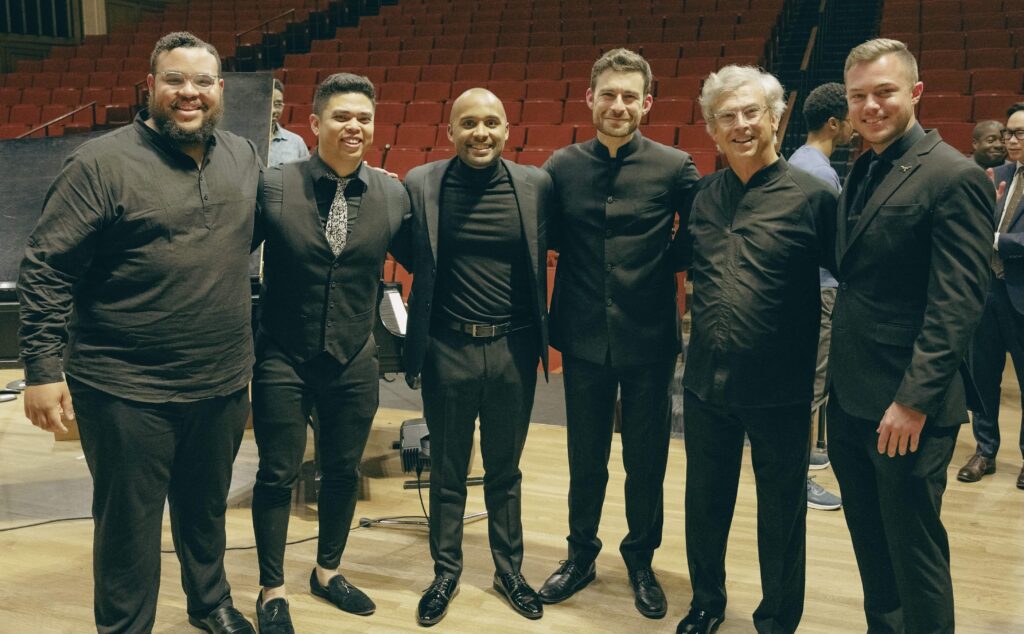
The goal of the graduate program in wind band conducting at The University of Texas at Austin is to provide an environment in which students can experience all learning, teaching, and administrative aspects of a comprehensive university band program. This includes:
- Conducting, teaching, and administrative tasks with Wind Ensemble/Wind Symphony/Symphony Band/Concert Band
- Conducting, teaching, and administrative tasks with Longhorn Band & Longhorn Pep Band
- Organizing rehearsal plans
- Planning and conducting sectionals for all ensembles
The graduate programs in band/wind ensemble conducting are designed to be small and highly select. The objective of the master’s and doctoral programs in band/wind ensemble conducting is to prepare highly competent conductors of wind music. Graduates will be prepared to function effectively in professional and academic settings.
The faculty of The University of Texas at Austin considers study in music history, theory and related fields essential components of a conductor’s preparation. The musical environment provided by the University and the Austin metropolitan area represents an ideal setting for graduate study in wind conducting.
The Butler School of Music maintains an excellent library and a distinguished faculty, in addition to sponsoring several outstanding wind performing organizations. These performing ensembles, which are composed entirely of students, differ in size, purpose and repertoire. Collectively they provide an outstanding musical resource for those enrolled in the conducting program.
Admission Procedure
The graduate programs in band/wind ensemble conducting are designed to be small and highly select. It is expected that the applicant will have had significant experience as a conductor (no less than two years of professional experience). Requirements for admission include:
1. A bachelor’s degree in music from an accredited institution. Exceptions may be made for students with degrees in other fields if equivalent training can be demonstrated.
2. A mastery of advanced conducting techniques gained through conducting experience beyond the training level.
3. Familiarity with a substantial repertoire of music (see Repertoire List).
4. A video excerpt recording of a performance (with the camera facing the conductor) of between ten to twenty minutes, and a video excerpt of approximately ten minutes of rehearsal. In both cases, the repertoire is of the candidates choosing.
The committee will be looking for a demonstration of unusually effective musical sensitivity on the part of the applicant, as well as the ability to communicate effectively with and stimulate a group of performers.
Applicants interested in the master’s degree should be familiar with and be able to conduct approximately 25% of the repertoire in both lists. Applicants interested in the Doctor of Musical Arts Degree should be familiar with and be able to conduct at least 50% of the repertoire in both lists.
Questions can be addressed to the graduate director of admissions at:
mga@mail.music.utexas.edu
and online application materials may be found at:
https://music.utexas.edu/apply/graduate-admissions
Repertoire List
Wind Ensemble Repertoire
Beethoven – Rondino
Beethoven – Octet
Benson – The Solitary Dancer
Berg – Kammerkonzert
Dahl – Concerto for Alto Saxophone and Wind Orchestra
Dvorak – Serenade in d minor, op. 44
Etler – Clarinet Concerto
Fiser – Report
Gounod – Petite Symphonie
Hindemith – Konzertmusik, op. 41
Hindemith – Konzertmusik, op. 49
Hovhaness – Symphony No. 4
Ives – Scherzo (Over the Pavements)
Mahler – Um Mitternacht
Mendelssohn – Overture für Harmoniemusik
Messiaen – Oiseaux Exotiques
Messiaen – Couleurs de la Cite Celeste
Messiaen – Et expecto Ressurectionem Mortuorem
Mozart – Serenade No. 11, K. 375
Mozart – Serenade No. 12, K. 388
Mozart – Gran Partitta, K. 361
Poulenc – Suite Francaise
Reynolds – Scenes
Reynolds – Scenes Revisited
Strauss – Serenade, op. 7
Strauss – Suite, op. 4
Varese – Integrales
Varese – Octandre
Band Repertoire
Bassett – Sounds, Shapes and Symbols
Benson – The Leaves are Falling
Benson – The Passing Bell
Berlioz – Symphonie, op. 15
Colgrass – Winds of Nagual
Copland – Emblems
Corigliano – Circus Maximus, Symphony No. 3
Dahl – Sinfonietta
Grainger – Colonial Song
Grainger – Lincolnshire Posy
Grantham – Fantasy Variations
Grantham – Southern Harmony
Harbison – Three City Blocks
Hindemith – Symphony in B flat
Husa – Apotheosis of this Earth
Husa – Music for Prague 1968
Krenek – Dream Sequence
Mackey – Wine-Dark Sea, Symphony for Band
Mennin – Canzona
Maslanka – Symphony No. 4
Maslanka – Symphony No. 8
Milhaud – Suite Francaise
Schoenberg – Theme and Variations, op. 43a
Stucky – Fanfares and Arias
Vaughan Williams – Tocatta Marziale



